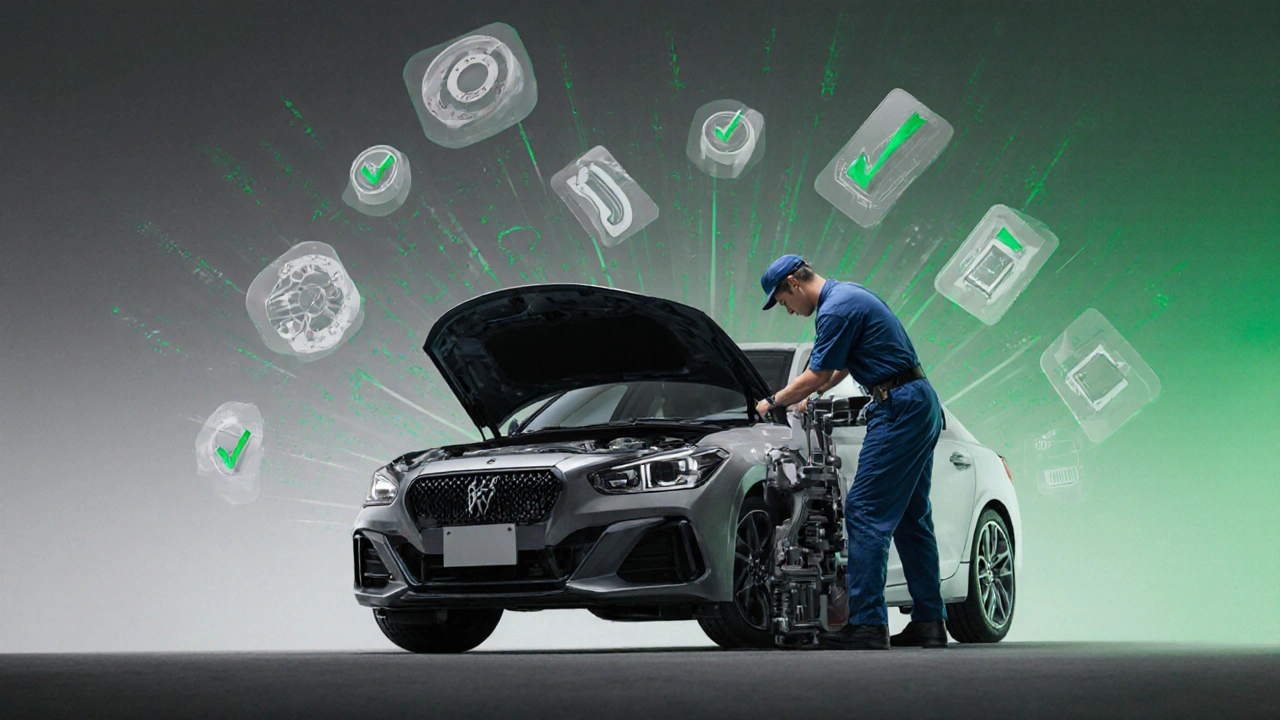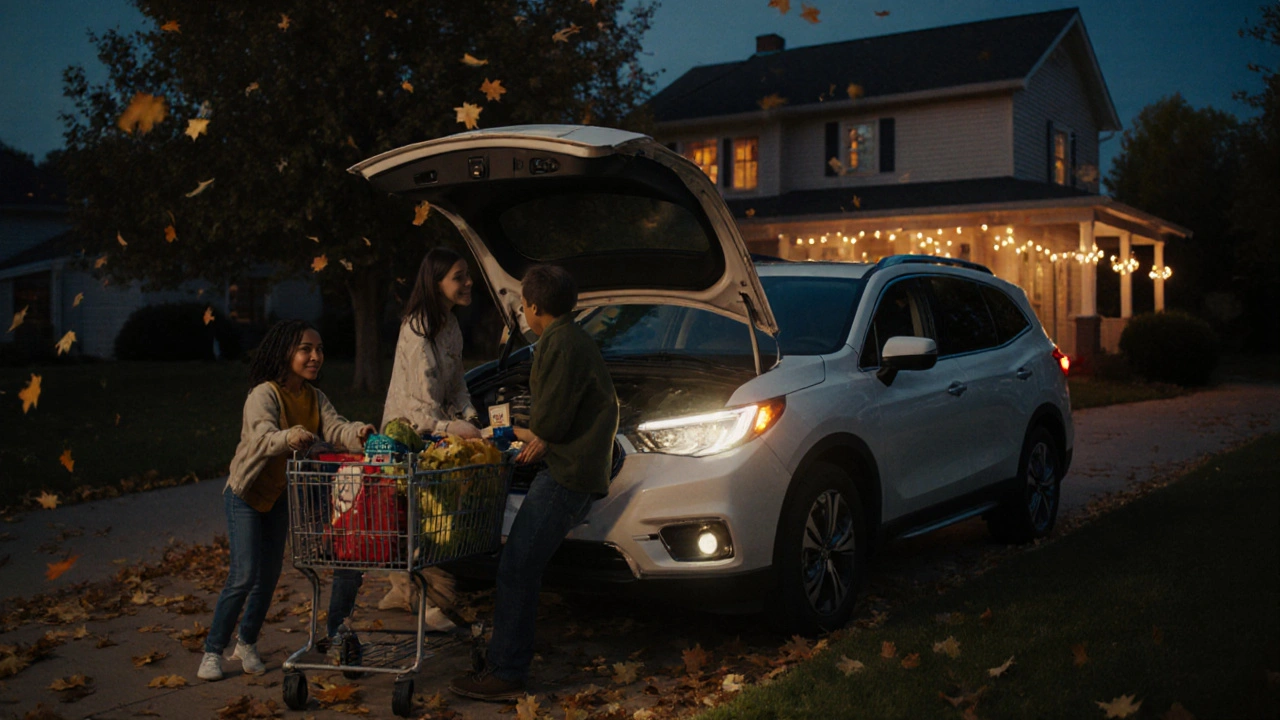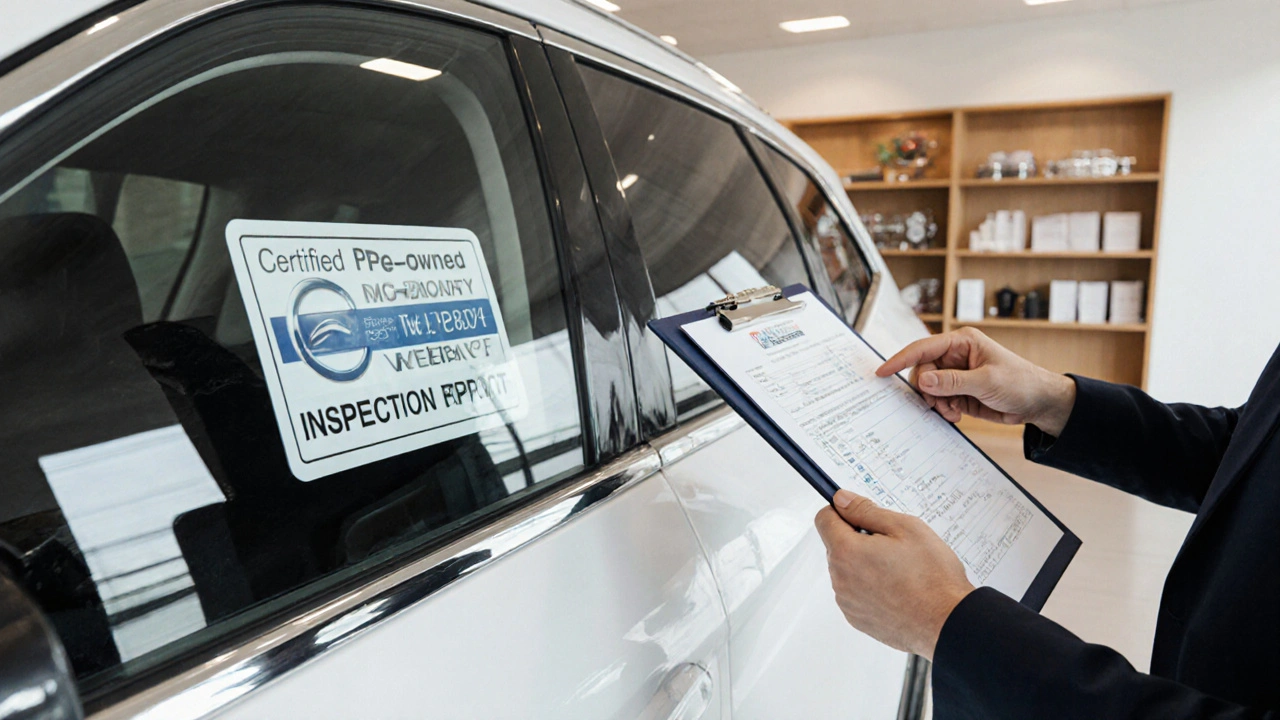Buying a car is one of the biggest purchases most people make. But when you’re staring at a stack of used cars and wondering if a certified pre-owned (CPO) model is really worth the extra cash, it’s easy to feel stuck. You know the base model is cheaper. You’ve heard horror stories about lemon cars. And you’ve seen those flashy CPO ads promising peace of mind. So is it actually worth it? Let’s cut through the noise.
What Exactly Is a Certified Pre-Owned Car?
A certified pre-owned car isn’t just any used car with a clean title. It’s a used vehicle that’s been inspected, reconditioned, and backed by the original manufacturer - not a third-party dealer. For example, if you buy a CPO Toyota, it’s certified by Toyota Motor Corporation, not some random used car lot in Ohio. These programs exist for brands like Honda, Ford, BMW, and Hyundai. Each has its own rules, but they all follow the same basic pattern: the car must be under a certain age (usually six years or less) and have low mileage (typically under 80,000 miles).
The certification process isn’t just a quick glance under the hood. Manufacturers require a multi-point inspection - often 150 to 200 points - covering everything from the engine and transmission to the brakes, suspension, electronics, and even the air conditioning. Any worn or faulty parts are replaced with genuine OEM components. That means if your CPO Ford has a cracked windshield, it gets a factory-approved replacement. If the brake pads are at 30% life, they’re swapped out. No cutting corners.
The Big Perks: Warranty, Inspection, and More
The biggest reason people choose CPO is the warranty. Most manufacturers offer a limited warranty that kicks in after the original new-car warranty expires. For example, a CPO Honda comes with a 7-year/100,000-mile powertrain warranty from the original in-service date. That’s not just a few extra months - it’s years of coverage you don’t get with a regular used car. Some brands even offer complimentary roadside assistance, free maintenance for the first year, and loaner cars during service visits.
Then there’s the inspection. A private seller might say their car runs great. A dealership might say the same. But a CPO car comes with a printed inspection report you can actually read. You can see exactly what was checked and what was fixed. No vague promises. No hidden surprises. You know what you’re getting because the manufacturer documented it.
And let’s not forget the history. CPO cars must have a clean title and no accident history. They’re pulled from manufacturer-authorized dealerships, meaning they’ve likely been well-maintained and driven by responsible owners. You’re not buying a car that was in a fender bender and patched up with bondo.

How Much More Does a CPO Car Cost?
Here’s the trade-off: you pay more upfront. On average, a CPO car costs $1,500 to $3,000 more than a similar non-certified used car. That’s not pocket change. But you’re not just paying for a sticker. You’re paying for confidence. A 2023 Honda Civic with 30,000 miles might sell for $22,000 as a regular used car. The same model, certified, might be $24,500. That $2,500 gap buys you a full warranty, a thorough inspection, and a 100% return policy in many cases.
Compare that to the cost of a major repair. A transmission replacement on a 2019 Toyota Camry? Around $3,500. A new engine? $5,000 or more. A faulty infotainment system? $1,200 to fix. If you buy non-certified and one of those things breaks six months after you drive it off the lot, you’re on your own. With CPO, the manufacturer covers it.
Who Benefits the Most From a CPO Car?
If you’re a first-time car buyer, CPO is a smart move. You don’t know what to look for, and you don’t want to get burned. If you’re buying a car for your teenager, you want reliability, not risk. If you’re replacing a car you’ve owned for ten years and need something dependable for commuting, CPO gives you that peace of mind.
It’s also great for people who drive a lot. If you’re logging 15,000 miles a year, a car with a 7-year warranty means you’re covered for years. And if you plan to sell the car later, CPO vehicles hold their value better than non-certified ones. Buyers trust the certification, so you’ll get a higher resale price.
But if you’re mechanically savvy, have access to a trusted mechanic, and don’t mind doing your own research, you might save money going non-certified. You can find a well-maintained used car with full service records and get an independent inspection for $100. If you’re confident in your judgment, you can skip the CPO premium.

What to Watch Out For
Not all CPO programs are created equal. Some brands offer better coverage than others. For example, Hyundai’s CPO program includes 10 years of powertrain coverage. Kia’s is similar. But some luxury brands limit coverage to just 12 months or 12,000 miles after the original warranty ends. Always read the fine print.
Also, be careful of dealers who add their own “certification” on top of the manufacturer’s. That’s not the same thing. A dealership might say “we certified this car,” but unless it’s stamped by the manufacturer - Toyota, Ford, BMW - it’s not a true CPO. Look for the official CPO badge on the window or in the paperwork.
And don’t assume every CPO car is perfect. Some have been in minor accidents that didn’t show up on the title. Always run a vehicle history report using the VIN. Carfax and AutoCheck are affordable and worth the $40.
Is It Worth It? The Bottom Line
Yes, buying a certified pre-owned car is worth it - if you value reliability, warranty coverage, and peace of mind over saving a few thousand dollars upfront. You’re not just buying a car. You’re buying protection against expensive repairs, a verified history, and a level of quality control you won’t get anywhere else.
Think of it like buying a new phone with AppleCare. You pay more, but if something breaks, you’re covered. Same idea. For most people, the extra cost is a small price to pay to avoid a costly, stressful repair down the road.
And here’s the kicker: many CPO programs let you return the car within 7 days if you’re not happy. That’s a risk-free trial. If you drive it for a week and it feels right, you’re golden. If not, you walk away with your deposit back.
If you’re shopping for a used car in the USA and you want something that feels almost new, with none of the risk - go certified. It’s not magic. It’s just smart.
Are certified pre-owned cars more expensive than regular used cars?
Yes, certified pre-owned cars typically cost $1,500 to $3,000 more than similar non-certified used vehicles. But that price difference covers a manufacturer-backed warranty, a 150+ point inspection, replacement of worn parts with genuine components, and often free roadside assistance or maintenance. For many buyers, the added cost is justified by the reduced risk of expensive repairs.
What’s the difference between CPO and a regular used car?
A regular used car is sold as-is, with no manufacturer warranty or guaranteed inspection. A certified pre-owned car has been inspected and reconditioned by the automaker, meets strict age and mileage limits, comes with a factory-backed warranty, and includes a detailed vehicle history report. CPO cars are pulled from dealer trade-ins and must pass the brand’s certification checklist.
Do all car brands offer certified pre-owned programs?
Most major brands in the U.S. offer CPO programs, including Toyota, Honda, Ford, Chevrolet, BMW, Mercedes-Benz, Hyundai, and Kia. Even some luxury and electric brands like Tesla and Volvo have their own certification systems. However, the coverage, length of warranty, and inspection standards vary by brand. Always check the specific program details before buying.
Can I negotiate the price of a certified pre-owned car?
Yes, you can negotiate. Even though CPO cars have set pricing guidelines, dealerships often have flexibility, especially if the car has been on the lot for a while. Ask about dealer incentives, end-of-month promotions, or trade-in bonuses. You can also compare prices across multiple dealerships - CPO inventory isn’t always priced the same.
Is a CPO car better than a new car?
It depends on your priorities. A new car comes with the full factory warranty and the latest tech, but it depreciates quickly - often losing 20% in the first year. A CPO car is usually 2-4 years old, so most of the depreciation has already happened. You get nearly new quality at a lower price, with a strong warranty still in place. For most buyers, CPO offers the best balance of value, reliability, and cost.
What should I check before buying a CPO car?
Always ask for the manufacturer’s CPO inspection report. Verify the VIN matches the paperwork. Run a Carfax or AutoCheck report to confirm no accidents or title issues. Test drive the car in different conditions - highway, city, and stop-and-go traffic. Check all electronics, climate controls, and safety features. Finally, confirm the warranty start date and coverage details in writing before signing anything.


Comments
Adrienne Temple
I bought a CPO Honda last year and honestly? Best decision ever. No stress, no surprise bills, and the dealer even threw in free oil changes for a year. 🙌
November 4, 2025 at 20:20
Sandy Dog
OMG I JUST HAD THE WORST EXPERIENCE WITH A CPO CAR AND I NEED TO TELL YOU EVERYTHING. I THOUGHT I WAS GETTING A LUXURY CAR EXPERIENCE BUT THE TIRE PRESSURE SENSOR WAS BROKEN AND THEY SAID IT WASN'T COVERED BECAUSE IT WASN'T 'CRITICAL'?? I'M STILL CRYING. LIKE, HOW IS A TIRE SENSOR NOT CRITICAL??? I ALMOST GOT HIT ON THE HIGHWAY BECAUSE I DIDN'T KNOW MY TIRE WAS FLAT. THIS IS A SCAM. A SCAM I TELL YOU. 😭
November 5, 2025 at 23:24
Nick Rios
Adrienne’s comment is spot on. I went non-CPO last time and ended up spending $2k on a transmission flush and new clutch within six months. The CPO premium feels like insurance-you hope you never need it, but you’re glad it’s there when you do.
November 6, 2025 at 08:54
Amanda Harkins
It’s funny how we treat cars like they’re sentient beings we have to protect. We spend more on warranties than we do on therapy. But hey, if it makes you sleep better at night, go for it. Just don’t pretend you’re not paying for peace of mind and not mechanical superiority.
November 7, 2025 at 05:02
Jeanie Watson
Yeah, I guess it’s worth it if you’re not good with money or mechanics. I just buy used and trust my gut. Works fine.
November 7, 2025 at 10:38
Tom Mikota
Let me just say-CPO doesn't mean 'certified perfect.' It means 'certified that the dealer didn't blatantly lie.' Also, why does everyone forget that the '150-point inspection' is done by the dealership's mechanic who's paid by commission? I've seen inspections where 'new brake pads' meant 'put on the same pads after sanding them down.' You want peace of mind? Get a Carfax, get an independent mechanic, and don't trust the badge.
November 9, 2025 at 00:04
Mark Tipton
Actually, the CPO system is a brilliant corporate marketing scheme designed to extract maximum profit from emotionally vulnerable buyers who fear being scammed. The manufacturers know that people associate 'certified' with 'guaranteed flawless,' but in reality, the certification process is standardized to the lowest common denominator-just enough to satisfy legal liability while maximizing profit margins. And the 'free maintenance'? It's usually just an oil change and a car wash. The real costs-brakes, suspension, electronics-are still your responsibility after the warranty expires. You're not buying reliability. You're buying a psychological crutch.
November 9, 2025 at 21:08
Adithya M
Bro, you're overthinking this. If you drive 15k miles a year, CPO is the only smart choice. I bought one last year-Toyota-and I'm on year 3 with zero issues. The warranty saved me $3k when the alternator died. You think $2k extra is a lot? Wait till you're stranded in the rain with a $4k repair bill.
November 9, 2025 at 23:03
Jessica McGirt
Tom, you’re right to be skeptical-but the key is knowing which brands deliver. Hyundai and Kia’s 10-year powertrain coverage is genuinely industry-leading. Toyota’s is solid too. But if you’re looking at a CPO BMW with only 12 months of coverage, you’re not getting value. Do your homework. The badge isn’t magic-it’s a starting point.
November 11, 2025 at 19:41
Donald Sullivan
Mark Tipton’s post is pure paranoia. The system isn’t perfect, but it’s leagues better than buying from some sketchy guy with a 'runs great' sign on his garage. I’ve seen too many people get burned by 'cheap' used cars. CPO isn’t about trust-it’s about accountability. If the manufacturer certifies it, they’re on the hook. That’s not a scam. That’s business.
November 12, 2025 at 10:08
Tina van Schelt
I call CPO cars the 'Netflix of automobiles'-you pay a little extra for the curated experience, no ads, no surprises, and the occasional free popcorn (free maintenance). It’s not about being rich. It’s about not wanting to spend your Saturday afternoon in a mechanic’s waiting room with a $200 coffee and a bad attitude.
November 13, 2025 at 09:12